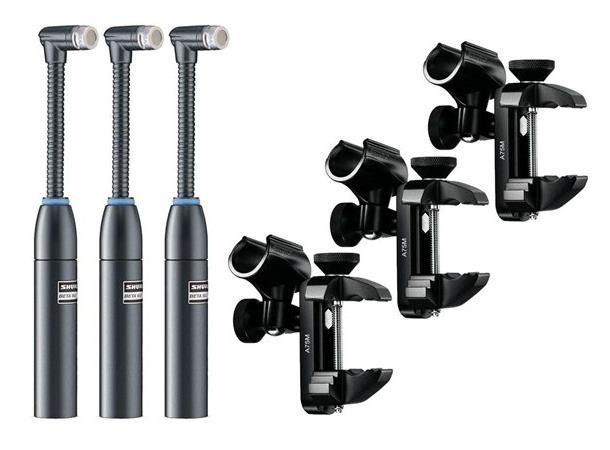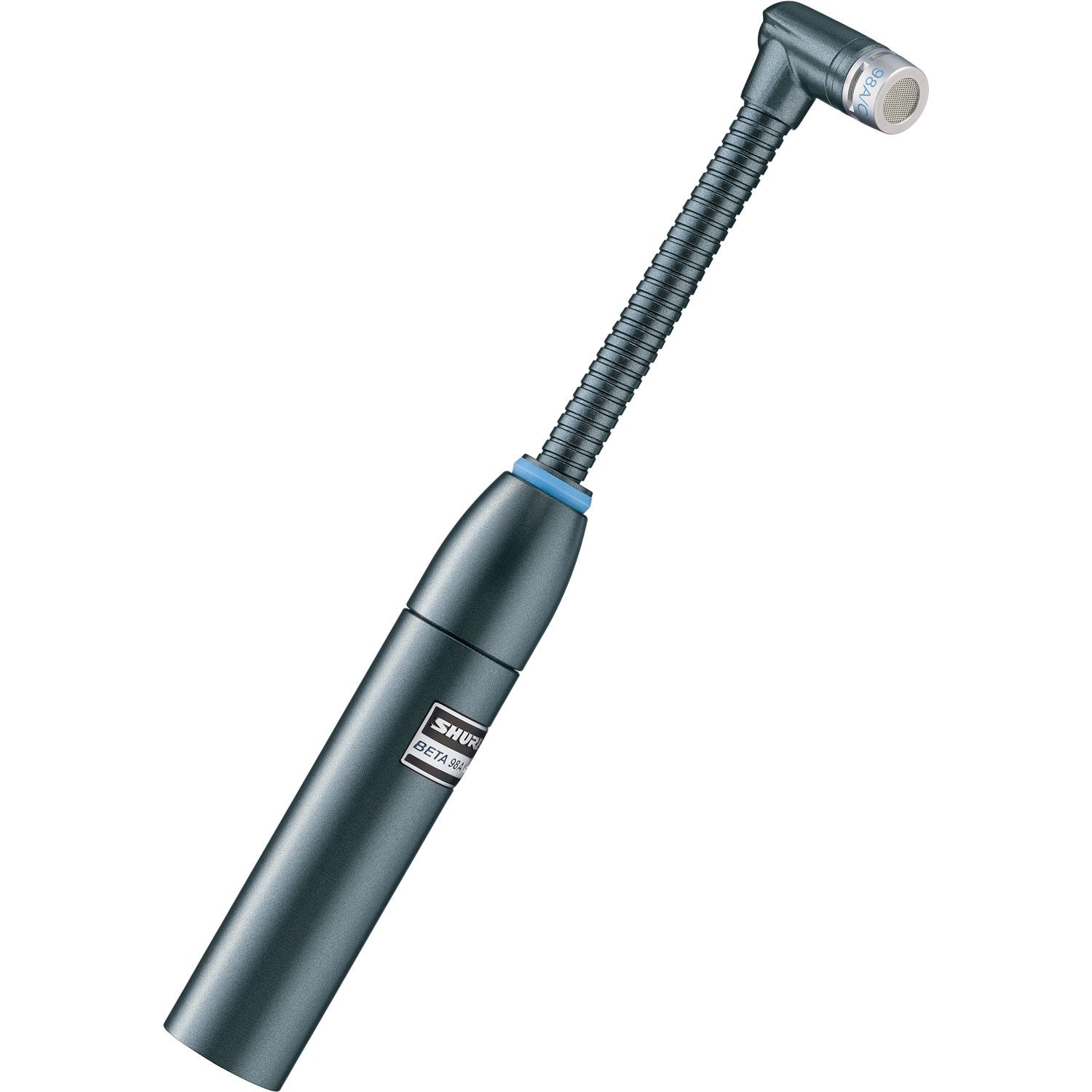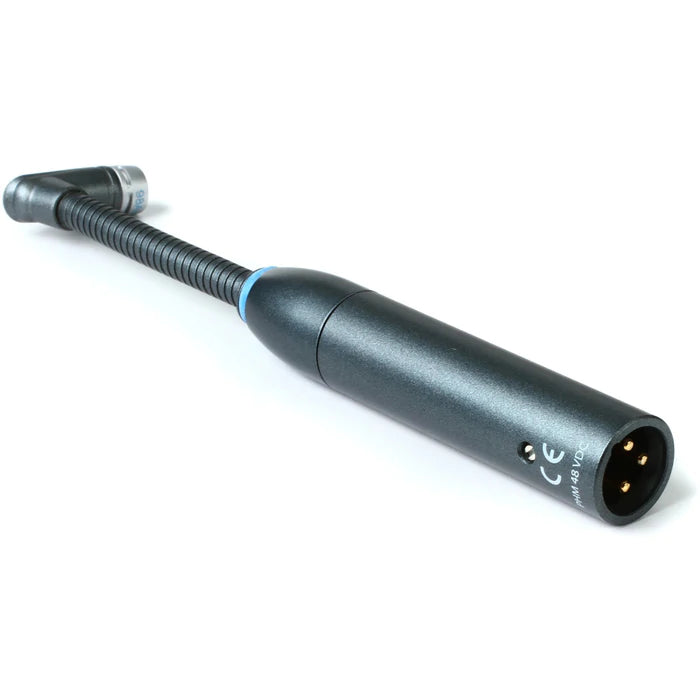Description
Drum microphone pack. Includes (3) BETA98AMP/C microphones and (3) A75M
universal microphone mounts.
PRODUCT DETAILS
What is the Beta 98AMP/C best suited to?
This premium drum microphone is ideal for use with snares and toms.
What are the characteristics of the Beta 98AMP/C?
The Beta 98AMP/C provides a smooth and natural sound, and features an integrated XLR preamplifier with a flexible gooseneck.
What is the difference between the Beta 98AMP/C and the other versions of the Beta 98?
The Beta 98AMP/C is a cardioid condenser instrument microphone and comes complete with an integrated preamplifier and the A75M universal drum mount. None of the other versions of the Beta 98 contain an integrated preamplifier. The Beta 98AMP/C has a wider dynamic range with a SPL level 7dB higher than Beta 98AD/C and the Beta 98A/C. The Beta 98AD/C is for the same applications and instead contains an A98D drum mount which features a flexible gooseneck. The Beta 98S & Beta 98D/S will continue to be available and have a supercardioid polar pattern.
Please note - any Beta drum microphone featuring the letter 'A' following the model number contains a new capsule and as a result you can expect a more natural high frequency response.
- Uniform cardioid polar pattern provides maximum gain-before-feedback and rejection of off-axis sound for smooth high-end response and control
- Precision-engineered design features integrated preamplifier and XLR connector to maximize setup efficiency while minimizing stage clutter
- Frequency response tailored for drums and percussion applications with a wide dynamic range for use in high SPL environments
- Flexible gooseneck for precise placement and easy adjustment
- Ships with A75M Universal Microphone mount with quick release, for versatile and secure instrument and/or stand mounting
- Furnished with snap-fit windscreen and zipper pouch
General Description
The Shure Beta 98AMP is a compact, high-output, condenser microphone for professional sound reinforcement and studio recording. An extremely uniform cardioid polar pattern provides excellent gain before feedback, off-axis rejection of unwanted noise, and performance in high sound pressure level (SPL) environments.
The Beta 98AMP features an integrated preamplifier with XLR connection, a flexible gooseneck, and is packaged with the A75M Universal Microphone Mount accessory for precision adjustments and minimal stage clutter. For use with drums, percussion, and other fixed-placement applications.
Variations
- Beta 98AMP/C: Beta 98AMP microphone furnished with the A75M Universal Microphone Mount.
- Beta 98AMP/C-3PK: includes three Beta 98AMP microphones and three A75M Universal Microphone Mounts.
Performance Characteristics
- Exceptional low-frequency reproduction
- Extremely high SPL handling
- High output level
- No crossover distortion
Features
- Premier live performance microphone with Shure quality, ruggedness, and reliability
- Uniform cardioid polar pattern for maximum gain before feedback and superior rejection of off-axis sound
- Tailored frequency response shaped for drums and percussion
- Wide dynamic range for use in high SPL environments
- Compact design and integrated preamp reduce stage clutter and ease setup
- Flexible gooseneck for precise placement and easy adjustments
- Enamel coated metal construction and stainless steel inner grille resist wear and abuse
Applications
General Rules for Use
- Do not cover any part of the microphone grille with your hand, as this will adversely affect microphone performance.
- Aim the microphone toward the desired sound source (such as the talker, singer, or instrument) and away from unwanted sources.
- Place the microphone as close as practical to the desired sound source.
- Work close to the microphone for extra bass response.
- Use only one microphone to pick up a single sound source.
- For better gain before feedback, use fewer microphones.
- Keep the distance between microphones at least three times the distance from each microphone to its source (“three to one rule”).
- Place microphones as far as possible from reflective surfaces.
- Add a windscreen when using the microphone outdoors.
- Avoid excessive handling to minimize pickup of mechanical noise and vibration.
Applications and Placement
The following table lists the most common applications and placement techniques. Keep in mind that microphone technique is largely a matter of personal taste; there is no one “correct” microphone position.
| Application | Suggested Microphone Placement | Tone Quality |
|---|---|---|
| Tom-Toms | One mic on each tom or between a pair of toms, 2.5 to 7.5 cm (1 to 3 in.) above drum heads. | Medium attack; full, balanced sound. |
| Remove bottom head and place a mic inside pointing up toward top drum head. | Maximum isolation; full, balanced sound. | |
| Snare Drum | 2.5 to 7.5 cm (1 to 3 in.) above rim of top head of drum. Aim mic at drum head. | Most "snap" from drumstick. |
| Cymbals | Close-mike with A75M mount, avoiding range of cymbal movement. | Maximum isolation; bright, with plenty of attack. |
Before each use, make sure the cartridge is tightly secured on the microphone, as vibration and accidental hits with drumsticks may loosen it, resulting in signal loss.
Positioning the Microphone
The flexible gooseneck allows precise adjustments to the microphone without moving the mount.
Excessive twisting or forcing the gooseneck into extreme positions can permanently damage the microphone.
A75M Universal Microphone Mount
The Shure A75M mounts the Beta 98AMP on a variety of surfaces and instrument hardware. Reference the furnished A75M guide to correctly mount the microphone.

BETA 98AMP MOUNTED WITH A75M
Load Impedance
Maximum SPL capability, output clipping level, and dynamic range vary with the input load impedance of the preamplifier to which the microphone is connected. Shure recommends a minimum input load impedance of 1000 Ohms. Most modern microphone preamplifiers meet this requirement. Higher impedance results in better performance for these specifications.
Power Requirements
This microphone requires phantom power and performs best with a 48 Vdc supply (IEC-61938). However, it will operate with slightly decreased headroom and sensitivity with supplies as low as 11 Vdc.
Most modern mixers provide phantom power. You must use a balanced microphone cable: XLR-to-XLR or XLR-to-TRS.
Specifications
Type
Electret Condenser
Frequency Response
20 to 20,000 Hz
Polar Pattern
Cardioid
Output Impedance
150 Ω
Sensitivity
at 1kHz, open circuit voltage, typical
-50.5 dBV/Pa(2.5 mV)[1]
Maximum SPL
1 kHz at 1% THD[2]
| 2500 Ω load | 157.5 dB SPL |
| 1000 Ω load | 153.0 dB SPL |
Signal-To-Noise Ratio[3]
63 dB
Dynamic Range
at 1kHz
| 2500 Ω load | 126.5 dB |
| 1000 Ω load | 122.0 dB |
Clipping Level
at 1 kHz,at 1% THD
| 2500 Ω load | 12.5 dBV |
| 1000 Ω load | 7.5 dBV |
Self Noise
equivalent SPL,A-weighted,typical
31.0 dB SPL-A
Common Mode Rejection
10 Hz to 100 kHz
≥60 dB
Power Requirements
11–52 V DCphantom power[4], 5.5 mA
Polarity
Positive pressure on diaphragm produces positive voltage on pin 2 with respect to pin 3
Net Weight
130 g(4.6oz.)
[1] 1 Pa=94 dB SPL
[2] THD of microphone preamplifier when applied input signal level is equivalent to cartridge output at specified SPL
[3] S/N ratio is the difference between 94 dB SPL and equivalent SPL of self-noise, A-weighted
[4] All specifications measured with a 48 Vdc phantom power supply. The microphone operates at lower voltages, but with slightly decreased headroom and sensitivity

Typical Frequency Response

Typical Polar Patterns

Overall Dimensions.
Estimate shipping
Refund Policy
We have a 30-day return policy, which means you have 30 days after receiving your item to request a return.
To be eligible for a return, your item must be in the same condition that you received it, unused, with all accessories and in its original packaging. You’ll also need the receipt or proof of purchase.
To start a return, you can contact us at boutique@seconcept.com. If your return is accepted, we’ll send you a return shipping label (at your expenses) as well as instructions on how and where to send your package back. Items sent back to us without first requesting a return will not be accepted and not refunded.
You can always contact us for any questions prior to purchase by email at: boutique@seconcept.com.
Damages and issues
Please inspect your order upon reception and contact us immediately if the item is defective, damaged or if you receive the wrong item, so that we can evaluate the issue and make it right.
Exceptions / non-returnable items
All Returns must contain all associated packaging and materials (ie accessories, manuals, wires, etc). Merchandise that is not returned in brand-new condition, including damages, abuse, marks, showing wear, or with missing packaging or accessories, will be subject to additional charges. Shipping and Handling charges (delivery and return) are non-refundable, including any shipping fees not directly incurred that are part of a free shipping promotion. Any items packaged with software, including but not limited to, DJ Controllers, Audio Interfaces, etc., must be returned with the original software disc including serial number and proof of deactivation.
We cannot accept returns on liquidation, special orders, liquid, needles, parts, used, sales, open box item or gift cards.
Exchanges
The fastest way to ensure you get what you want is to return the item you have, and once the return is accepted, make a separate purchase for the new item.
Refunds
We will notify you once we’ve received and inspected your return, and let you know if the refund was approved or not. If approved, you’ll be automatically refunded on your original payment method. Please remember it can take some time for your bank or credit card company to process and post the refund too.






